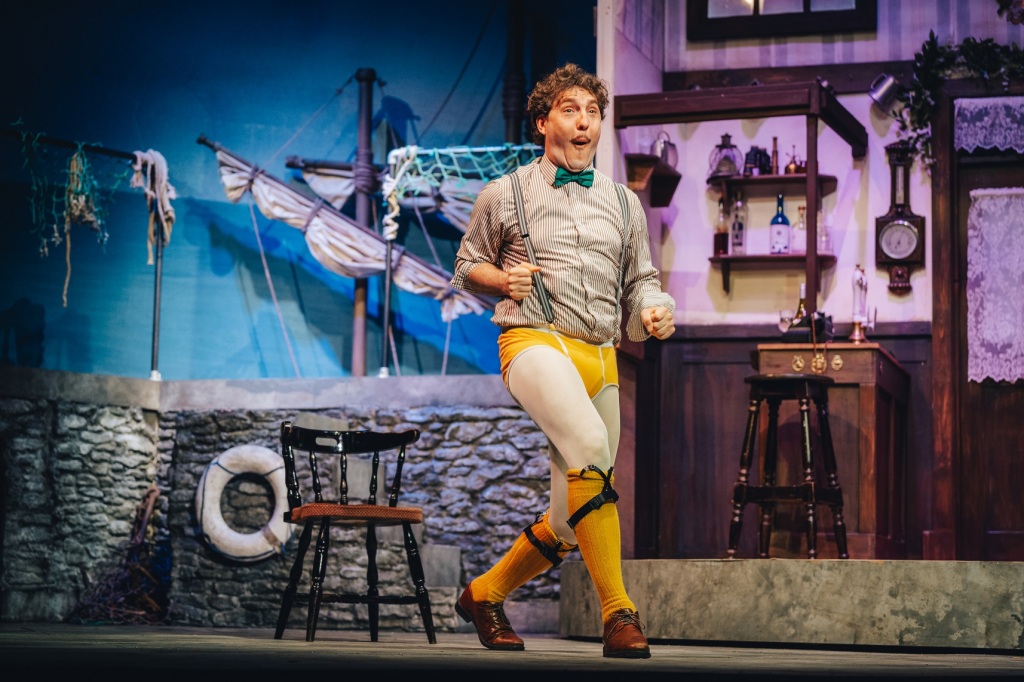TWELFTH NIGHT: A Cornish Tale
Gatehouse Theatre, Stafford, Tuesday 25th June 2024
I will admit that 1950s Cornwall doesn’t immediately spring to mind when I think of Illyria, but there is where director Sean Turner sets his production of one of Shakespeare’s finest comedies. And I will also admit it is, for the most part, a good fit.
We begin, not with Orsino’s famous opening line, but with a stylised depiction of the shipwreck that separates twins Viola and Sebastian. It is beautifully done, slow-motion physicality and superb lighting (kudos to lighting designer Barry Smith). It’s a powerful, theatrically impactful moment. The show never quite lives up to this, but it comes close a few times.
Molly Windsor’s Viola lets herself down either by garbling the dialogue (that first scene zips by) or reciting it almost deadpan. Usually, it can take a few minutes for the ear to get accustomed to Shakespeare’s language, whoever’s doing it. Windsor doesn’t give us a chance. She rushes through this expositional scene quite remarkably for a character who only seconds ago was spitting up seawater. Elsewhere, she is a bit one-note. This Viola needs tuning, to give us more light and shade.
Natalie Anderson’s Olivia has no shortage of vim and vigour. She is a flighty young woman, mourning her dead brother in a black cocktail dress (her not him) and is certainly not ‘addicted to melancholy’ as she is later described. Here, then, her show of grieving is precisely that, a show to keep the amorous Orsino at bay, rather than a more genuine depression she casts off in light of her attraction to Cesario (Viola in disguise). Anderson is funny, almost over-the-top, wearing all her emotions on her non-existent sleeves.
Stand-up genius Seann Walsh is a surprising spot of casting as Malvolio. It turns out to be quite a coup. Walsh, already having proved himself a decent actor on the small screen, acquits himself excellently well, bringing us the steward’s haughtiness and pomposity, his arrogance, and expresses it through physical comedy. There are undertones of Leslie Phillips and Frankie Howerd in his characterisation – and I mean that as a compliment.
Also strong are Bob Golding as a fun-loving Sir Toby Belch, partnered with Callum Sim’s nice-but-dim Andrew Aguecheek and his ever-present surfboard. Liz Jadav is superb as the scheming Maria, and Benedict Landsbert-Noon makes a fine impression as Sebastian, the supposedly drowned twin brother. Andre Bullock’s Antonio brings a touch of pathos — especially now in Pride Month, when we realise in the 1950s, homosexuality was still regarded as a crime. Peter Watts is a burly Orsino. Imagine Captain Haddock drawn by Tom of Finland. He’s definitely a man of action, toting anachronistic plastic receptacles around, but his outbursts of finer feelings are as heartfelt as we could wish.
Sha Dessi is a gender-swapped Feste the jester, treating us to her fine singing voice at intervals throughout proceedings. She’s a lively figure, with all the impudence and cheek required of the role but I think Alfie Heywood’s costume design could give her something, some detail, that marks her out as the ‘allowed fool’, the entertainer. Dessi’s talent makes her stand out, but a splash of colour or a touch of face paint would help us distinguish her position within this coastal community.
Heywood is also responsible for the remarkable set on which it all plays out. There’s a revolving pub (Olivia’s late father was the landlord), stone walls (are they called groynes? The schoolboy in me thinks they might be) and plenty of fishing nets festooned around. It grounds the drama in its reality, aided by Hattie North’s evocative sound design — the waves are never far away — but what really sets the scene, mood, and tone of this most melancholic comedy is the three-piece folk band, Evolution of Fishermen. This trio entertain before the show, during, and after – you can join them on stage for a jig around, if you’re so inclined.
All in all, it’s a hugely enjoyable evening of theatre. While some (like me) might quibble with some of the choices, if you look beyond that, you’re in for an entertaining show, with moments that touch (the final reunion of the twins, for example). You might even feel sorry for Malvolio!
The brilliance of Shakespeare shines through, even though some of his nuance slips through the net.
☆ ☆ ☆ ☆

Star in garters: Seann Walsh as Malvolio









